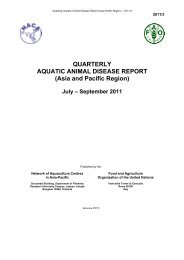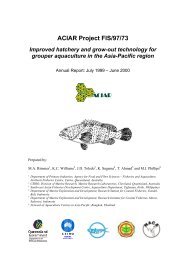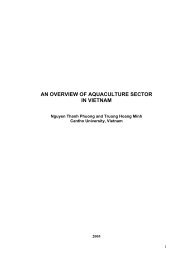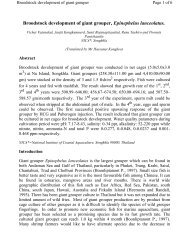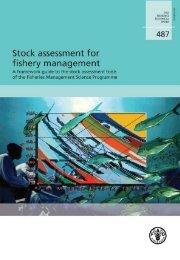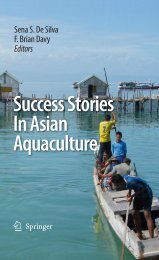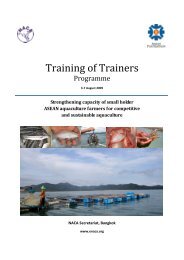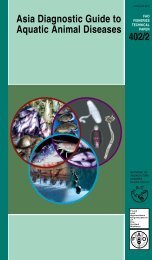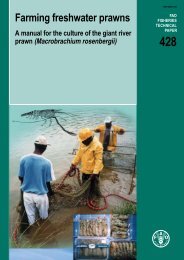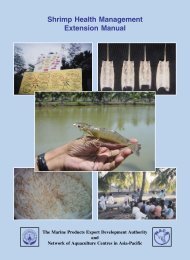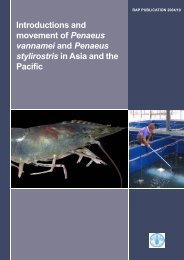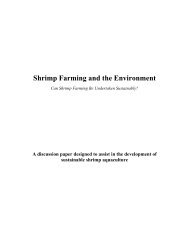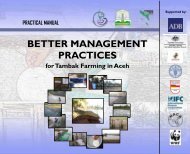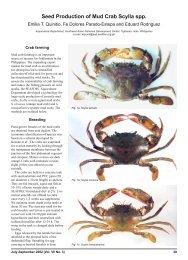State of World Fisheries and Aquaculture 2004 - Library
State of World Fisheries and Aquaculture 2004 - Library
State of World Fisheries and Aquaculture 2004 - Library
Create successful ePaper yourself
Turn your PDF publications into a flip-book with our unique Google optimized e-Paper software.
FOREWORD<br />
The <strong>State</strong> <strong>of</strong> <strong>World</strong> <strong>Fisheries</strong> <strong>and</strong> <strong>Aquaculture</strong> has changed its appearance – <strong>and</strong><br />
we in the FAO <strong>Fisheries</strong> Department hope you agree that it is a change for the<br />
better. However, the way we present our view <strong>of</strong> the state <strong>of</strong> world fisheries <strong>and</strong><br />
aquaculture remains almost unchanged. As in previous issues, the report begins<br />
by providing an overview <strong>of</strong> developments in world fisheries <strong>and</strong> aquaculture,<br />
followed by a review <strong>of</strong> issues confronting fishers <strong>and</strong> fish farmers, <strong>and</strong> a<br />
presentation <strong>of</strong> seven in-depth studies undertaken by FAO. The report concludes<br />
with some thoughts on the future <strong>of</strong> fisheries <strong>and</strong> aquaculture, from both shortterm<br />
<strong>and</strong> longer-term perspectives.<br />
Developments during the past two years confirm the trends already<br />
observed at the end <strong>of</strong> the 1990s: capture fisheries production is stagnating,<br />
aquaculture output is exp<strong>and</strong>ing <strong>and</strong> there are growing concerns with regard<br />
to the livelihoods <strong>of</strong> fishers <strong>and</strong> the sustainability <strong>of</strong> commercial catches <strong>and</strong> the<br />
aquatic ecosystems from which they are extracted. The <strong>State</strong> <strong>of</strong> <strong>World</strong> <strong>Fisheries</strong><br />
<strong>and</strong> <strong>Aquaculture</strong> <strong>2004</strong> reports on several <strong>of</strong> these issues.<br />
It is not only fishers <strong>and</strong> fish farmers who have these concerns; they are<br />
increasingly shared by civil society at large. Moreover, the importance <strong>of</strong><br />
international trade in fish <strong>and</strong> fish products, combined with the trend for major<br />
fishing <strong>and</strong> trading companies to operate on a multinational basis, means that<br />
such issues are becoming global in nature – affecting a growing number <strong>of</strong><br />
countries, be they large fish producers or large consumers <strong>of</strong> fish. It is heartening<br />
to note that governments <strong>and</strong> other stakeholders have begun to collaborate<br />
with their neighbours <strong>and</strong> partners in trade in an effort to find shared solutions.<br />
Concrete examples <strong>of</strong> positive outcomes <strong>of</strong> this “globalization <strong>of</strong> concerns”<br />
are the establishment <strong>of</strong> new regional fishery management organizations <strong>and</strong><br />
the strengthening <strong>of</strong> existing ones. It is probable that ongoing discussions<br />
among intergovernmental organizations on topics such as trade in endangered<br />
aquatic species, the use <strong>of</strong> subsidies in the fishing industry, <strong>and</strong> labour st<strong>and</strong>ards<br />
in fisheries will also result in agreements <strong>of</strong> overall benefit to world society.<br />
Given the nature <strong>and</strong> tone <strong>of</strong> the international discussion on fishery issues<br />
<strong>and</strong> the developments observed during recent years, I believe that fishers<br />
<strong>and</strong> fish farmers, in collaboration with governments <strong>and</strong> other stakeholders,<br />
will overcome the obstacles they face currently <strong>and</strong> will succeed in ensuring<br />
sustainable fisheries <strong>and</strong> continued supplies <strong>of</strong> food fish at least at their present<br />
levels.<br />
Ichiro Nomura<br />
Assistant Director-General<br />
FAO <strong>Fisheries</strong> Department



